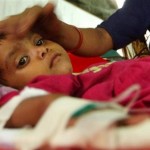Symptoms and Causes of Baby Diarrhea
 It is estimated that 70 million children, under the age of 5 years die every year. In 30% of these children the diarrhea is associated with malnutrition. While diarrhea can be worrying in small babies, in older children it is unlikely to cause any health risk as long as you ensure that your child has plenty to drink while he has diarrhea.
It is estimated that 70 million children, under the age of 5 years die every year. In 30% of these children the diarrhea is associated with malnutrition. While diarrhea can be worrying in small babies, in older children it is unlikely to cause any health risk as long as you ensure that your child has plenty to drink while he has diarrhea.
Symptoms
When a child passes runny, watery stools more frequently than usual it is called diarrhea. In small babies, who are only breastfed, very soft faeces may be passed, which and should not be mistaken for loose motions.
Causes of Baby diarrhea
The most common cause of diarrhea is a viral or bacterial infection of the digestive tract, in medical terms it is known as ‘Gastroenteritis’. In viral diarrhea there is no role for medicines. In most cases, medicines are not effective, the body rids itself of the infection. The best treatment is to allow the body to get rid of infection itself while taking care to maintain the optimum level of fluid and salts in the body.
If your baby is running fever, has vomiting with watery stool, and is also unable to take a feed, consult your doctor without any delay for proper diarrhea treatment.
Diarrhea is more common in creased possibilities of infection, following are some of those:
Bottle Feeding: Diarrhea is more common in arterially-fed infants than in breast-fed infants. It is also more frequent in spoon-fed infants, more so in the low socio-economic groups. It is frequently associated with malnutrition.
Adding Sugar: In bottle-fed babies, adding sugar to the feed may cause diarrhea. Babies may not be able to digest sugar. If you notice your baby getting diarrhea when you add sugar-never do so.
Excessive Fruit Juice: Fruit juice are very nutritious, but an excess of juice or sweet drinks can cause stomach upsets in babies. Normally, orange or sweet lime juice should be diluted with water. Sweet drinks (squashes) should not be given at all. They any nutritional benefits. They make your baby overweight and damage his teeth.
Medicines: Sometimes medicines given for any other ailment can cause diarrhea. The most common culprits are antibiotics. Consult your doctor if your child develops diarrhea while he or she is on any medication.
Toddler Diarrhea: This is a common condition in which a young child fails to digest food properly. The faeces contain recognizable pieces of food. This may be due to inadequate chewing and is not a danger to general health. However, it is wise to discuss your child’s symptoms with your doctor.
Symptoms of ‘Dehydration’ in infants
The serious risk associated with diarrhea is dehydration. If the child is very small and has vomiting along with diarrhea, the chances of dehydration are much higher. If your child is vomiting continuously and not retaining anything, he had diarrhea. Take the child to a hospital immediately. Intravenous fluids are life saving in such a situation.
It is very important to recognize the signs and symptoms of dehydration.
- The soft spot (fontanelle) on the baby’s head is depressed.
- Eyes looks sunken.
- Mouth becomes dry.
- There is no urination for more than 3-4 hours.
- The child looks lethargic and irritable.
- There is a lack of elasticity of the skin.
All these signs indicate dehydration. Consult your doctor immediately.
Constipation with Diarrhea
If your children often suffers from constipation and passes loose stools in between and soil his or her underclothes, the condition is known as encopresis (bowel incontinence). This is due to constipation where a hard mass of faces partially blocks the rectum, allowing liquid matter to seep past. Such constipation may be the result of an emotional upset.
Your doctor will probably recommend that you add extra fluids, fruit and vegetables to your child’s diet and may prescribe a laxative.
This treatment may need to be continued for several months. If there seems to be an underlying emotional problem, your doctor may arrange for specialist help.
Dangers of diarrhea
Patients with diarrhea can lose large amounts of water and salts. This is called dehydration. Dehydration can develop rapidly within a few hours. The body needs water and salt to live. When the loss of water and salt through diarrhea is equal to about ten percent (1/10th) of the body weight, dehydration becomes severe and the person will die within an hour or two.
Why diarrhea is the most common cause of death in children under three years of age?
- A small child’s body has not yet learned to defend itself well against infection.
- Malnourished children get diarrhea easily and diarrhea makes malnutrition worse.
- During diarrhea, some children do not get enough food and drink. Many people believe that it is dangerous to feed a child who has diarrhea. This is wrong because starvation leads to malnutrition. Children are not able to say that they are thirsty and are often not given enough to drink, especially on the their journey from home to the health center or hospital.